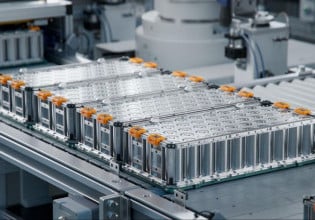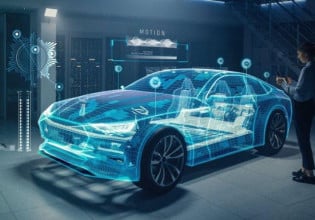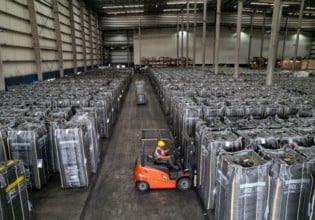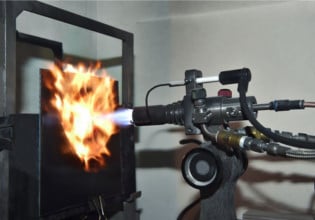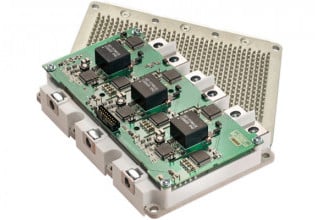Global Push to Develop Li-Ion Battery Technology for Electric Vehicles Continues
Lithium-ion (Li-ion) batteries, not so long ago considered to be lacking the power output and density for practical automotive applications, are increasingly being considered an essential ingredient in the overall goal of lowering the extra-costs associated with gasoline-electric hybrid vehicles. The push to develop Li-ion technology is manifesting on a global scale.
Following last month’s joint announcement by Nissan Motor Co. and NEC Corp. of a venture to produce the batteries by 2009, the Japanese companies Mitsubishi, Mitsubishi Motors Corp., and Yuasa Corp. announced that they will join to produce Li-ion batteries for use in automobiles by the same year. According to the announcement, GS Yuasa will hold 51% in the new venture, which will be based at the company’s headquarters in Kyoto, and there will be a new production line capable of producing 200,000 cells a year.
Japan’s Nippon Chemical Industrial Co. announced that it will make and sell a Li-ion electrolyte that had been developed by the American company, Bridgestone Corp.. Nippon states that it expects demand for the product to grow on the back of a likely rise in the use of the batteries in vehicles. The company intends to start manufacturing the electrolyte by the end of 2007 and to have the capacity to roll out the equivalent of 500 tons of electrolytes annually at an unspecified point in the future.
In the United Kingdom, Zytek Systems announced that it has placed a development order for a fully integrated plug in hybrid Li-ion battery system with Amberjac Projects Ltd. The project is an EST funded program to create a working example of a passenger Hybrid Vehicle with extended electric-only range. The car is scheduled to be delivered back to Zytek for trials in August 2007.
Simon Sheldon, Managing Director of Amberjac, stated, "This is a great opportunity for both Zytek and Amberjac to demonstrate plug in hybrid systems as an effective transport solution and show we have the capability to put this type of system in place today rather than on the extended timescales other players in this field are working to."
In the United States, ExxonMobil Chemical announced that its affiliate, Tonen Chemical Corp., is now producing on a commercial line its microporous films for hybrid and electric vehicles. The films are designed to meet the safety, reliability and power performance requirements of Li-ion batteries used in these applications.
The separators are produced using a proprietary wet, bi-orientation manufacturing process. The new films are co-extruded using specially tailored, high heat resistant polymers for improved separator properties. These enhancements to Tonen Chemical’s proven technology ensure consistent separator quality and easy adoption in HEV Li-ion applications. The separators exhibit what is said to be a unique combination of properties including enhanced permeability, higher meltdown temperature and melt integrity, without compromising the shutdown temperature and mechanical strength. The higher meltdown temperature is said to significantly increase the film’s thermal safety margin.
BAE Systems announced that it will begin offering an advanced Li-ion energy storage unit with its next-generation HybriDrive® propulsion system for hybrid electric buses. The new Li-ion energy storage system is said to be lighter than energy storage systems currently in production (reducing vehicle weight improves fuel economy and reduces emissions). The Li-ion energy storage system is fault-tolerant – designed to keep operating even if individual battery cells fail. The new battery features Nanophosphate™ lithium-ion chemistry developed by A123Systems. BAE Systems’ HybriDrive propulsion system is available on the DaimlerChrysler Orion VII hybrid transit bus. The next-generation HybriDrive system featuring lithium-ion energy storage will be available for commercial buses beginning in 2008.
Finally, scientists at the US Department of Energy’s Argonne National Laboratory announced that they have developed a new approach to increasing the capacity and stability of rechargeable Li-ion batteries. An active component that provides for charge storage is embedded in an inactive component that stabilizes the structure. The positive electrode is comprised of a unique nano-crystalline, layered-composite structure.
In recent tests, the new material yielded exceptionally high charge-storage capacities, greater than 250 mAh/g, or more than twice the capacity of materials in conventional rechargeable lithium batteries. In addition, by focusing on manganese-rich systems, instead of the more expensive cobalt and nickel versions of lithium batteries, overall battery cost is also reduced, said researchers.
The rechargeable batteries, which would incorporate the new materials, can be used in a diverse range of applications, ranging from consumer electronics such as cell phones and laptop computers, to cordless tools and medical devices such as cardiac pacemakers and defibrillators. In larger batteries, the technology could be used in the next generation of hybrid electric vehicles and plug-in hybrid electric.


